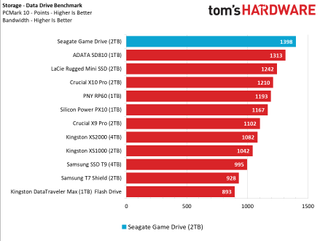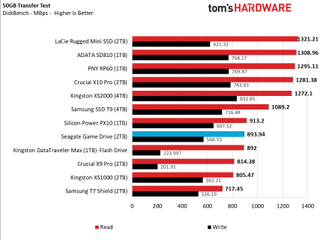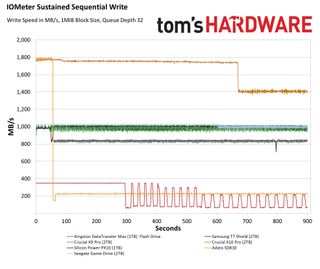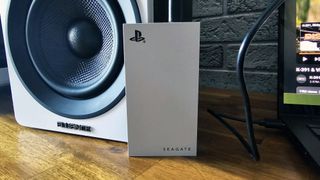Tom's Hardware Verdict
Seagate's Game Drive External SSD performs well and looks like a PlayStation accessory. But similarly performing alternatives are available for much less.
Pros
- +
Good performance
- +
PlayStation aesthetics
Cons
- -
Very expensive compared to similarly-performing alternatives
Why you can trust Tom's Hardware
How much are you willing to pay for external storage that matches the look of your PS5? Seagate hopes the answer is $129.99 for a 1TB SSD and $219.99 for 2TB, which is roughly twice the price of similarly-performing alternatives. The Seagate Game Drive External SSD sports a white and black exterior and Playstation logo that at least partially accounts for the drive's high price. It's also one of the faster 10Gbps drives we've tested in our PC-based benchmarks.
But Sony only allows external storage to be used for running older PS4 games and backing up PS5 titles , so it's unclear how much speed really matters. If you're mostly using this drive for backups and so you don't have to re-download games that you move off of your internal drive, you can just start the process when you're done with a gaming session and walk away until the next time you want to game.
Seagate tries to sweeten the deal with this drive by including a two-week trial of PlayStation Plus Premium, but it doesn't apply to existing members. And I feel like if you're considering buying an external drive to match your PS5, there's a good chance you're already a subscriber.
Seagate Game Drive External SSD Specs
| Product | 1TB | 2TB |
| Pricing | $129.99 | $219.99 |
| Interface / Protocol | USB 3.2 Gen2 (10Gbps) | USB 3.2 Gen2 (10Gbps) |
| Included | USB Type-C to Type-A cable | USB Type-C to Type-A cable |
| Sequential Read | Up to 1,000 MBps | Up to 1,000 MBps |
| Sequential Write | Up to 1,000 MBps | Up to 1,000 MBps |
| Dimensions | 3.78 x 1.97 x 0.43 | 3.78 x 1.97 x 0.43 |
| Weight | 2.45 ounces (69.5 g) | 2.45 ounces (69.5 g) |
| Warranty | 3 years | 3 years |
Design of the Seagate Game Drive External SSD





At 3.78 x 1.97 x 0.43 inches and 69.5 grams, with a black plastic bottom and matte-white top and sides, the Seagate Game Drive External SSD certainly looks like it belongs next to a PS5 (though PS4 support is also listed on the box). There's a PlayStation logo on the top and a blue light bar on the bottom. Part of me wishes the company had gone a step further to emulate the distinctive shape of Sony's console, but Seagate drive's shape is just your typical storage rectangle.
The drive comes with both USB Type-A and USB Type-C cables and a 3-year warranty, as well as the two-week trial of PlayStation Plus Premium.
Comparison Products
Most of the drives we've tested recently sport faster 20Gbps (USB 3.2 Gen2 2x2) interfaces, but the Game Drive External SSD's primary competition on our charts with be the previously mentioned Silicon Power PX10 (currently $125 in the 2TB capacity), and Crucial's X9 Pro ($163 for 2TB as of this writing), both 10Gbps drives. Given the Seagate drive's $220 launch price, it needs to impress when it comes to performance. And in many ways it does.
PlayStation 5 Testing
Our PlayStation 5 testing was fairly limited.
Writing 193GB to the drive via the faster USB-A ports at the back took 16 minutes and 14 seconds (and 10 seconds longer via the USB-C port on the front of the console, likely just down to run-to-run variance), and 26 minutes and 30 seconds to read from the drive to the PS5's internal SSD.
We also did the same task using a Seagate Xbox 5TB hard drive. The same 193GB folder took more than twice as long, 32 minutes and 52 seconds, to write to the external hard drive, and slightly longer – 1,856 seconds – to write the data back to the console's internal storage. In short, as you might expect, it's much faster to write to this external SSD than it is to write to a spinning-platter hard drive. And some of that speed advantage carries over to reading from the drive, onto the PS5's internal storage, but not as much as you might think.
Windows Testing
Trace Testing - PCMark 10 Storage Benchmark
PCMark 10 is a trace-based benchmark that uses a wide-ranging set of real-world traces from popular applications and everyday tasks to measure the performance of storage devices.

On this first test, the Seagate Game drive impressively comes in first place, beating out drives like the Crucial X10 Pro and Adata's SD810, that technically have twice the bandwidth.
Transfer Rates – DiskBench
We use the DiskBench storage benchmarking tool to test file transfer performance with a custom 50GB dataset. We copy 4,617 files (images, videos, and software ISO files) to a folder on the test drive (write). Then, after leaving the system idle for five minutes, we run the same test in reverse, moving the test folder to a different location on our PCIe 4.0 testing drive.

In this real-world performance test, Seagate's drive looks less impressive. Sure, it's not surprising that the plethora of 20Gbps drives at the top of the chart perform much better. But the Game Drive lands just below Silicon Power's much cheaper PX10 10Gbps drive and just above (at least on read speeds) Kingston's DataTraveler Max, which is a flash drive (albeit a fast one).
Synthetic Testing CrystalDiskMark
CrystalDiskMark (CDM) is a free and easy-to-run storage benchmarking tool that SSD companies commonly use to assign performance specifications to their products. It gives us insight into how each device handles different file sizes. We run this test at its default settings.

The synthetic large-file results here are similar to our real-world results above. Segate's drive performs well for a 10Gbps drive, but is slightly slower than the cheaper (and smaller) Silicon Power alternative.

When it comes to random writes/IOPS, something that isn't likely all that important for a backup drive, Seagate's Game Drive lands comfortably in the middle, while the competing Silicon Power drive sits impressively at the top of our chart.
Sustained Write Performance
A drive's rated write specifications are only a piece of the performance picture. Most external SSDs (just like their internal counterparts) implement a write cache, or a fast area of flash, programmed to perform like faster SLC, that absorbs incoming data. Sustained write speeds often suffer tremendously when the workload saturates the cache and slips into the "native" TLC or QLC flash. We use Iometer to hammer the SSD with sequential writes for 15 minutes to measure both the size of the write cache and performance after the cache is saturated.

This is the most grueling of our storage benchmarks, and the one most important for creative professionals who move lots of data. Here, the Seagate Game Drive External SSD delivered write speeds above 1,000 MBps for an impressive 10 minutes, before becoming more erratic, but remaining close to its peak speeds.
This is impressive sustained performance, and better than the Silicon Power drive, which dropped to the mid-800 MBps range after less than a minute. Still, for gaming purposes plugged into a PS5, you wouldn't notice the difference between these two drives. This kind of sustained performance is better suited to professional workloads.
Conclusion

Seagate's Game Drive External SSD is a good performer for a 10Gbps drive, at least in our Windows-based testing where we have comparative data. And it will certainly serve you well for running PS4 titles or backing up PS5 titles or other game files – just as nearly every external SSD would. But its launch price makes Seagate's drive a hard sell unless you're a collector and / or a big PlayStation fan who wants your external storage to match your gaming console.
The Game Drive's street price will likely drop from the MSRP, as we've seen with Samsung's T5 Evo, which was also priced too high at launch. But at $129.99 (1TB) and $219.99 (2TB), Seagate's drive needs to dip 40-50% before it's worth considering for those unwilling to pay a hefty price premium for the PlayStation branding.
MORE: Best SSDs
MORE: Best External SSDs
After a rough start with the Mattel Aquarius as a child, Matt built his first PC in the late 1990s and ventured into mild PC modding in the early 2000s. He’s spent the last 15 years covering emerging technology for Smithsonian, Popular Science, and Consumer Reports, while testing components and PCs for Computer Shopper, PCMag and Digital Trends.
-
kb7rky JESUS CHRIST...$100 difference between the two? I can get a 4TB SSD from Crucial for about the price of that 2TB Seagate.Reply
